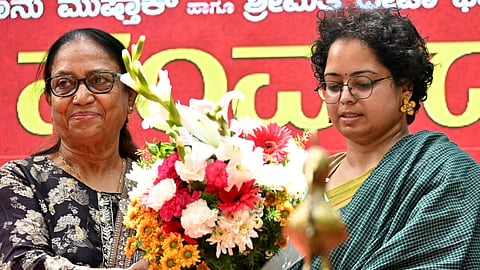

BENGALURU: International Booker Prize winner Banu Mushtaq noted that many people carry the prejudice that successful women, especially those from the Muslim community, must either be unmarried or divorced.
Speaking at a felicitation event organised by the Karnataka Media Academy in association with the Bangalore Press Club, Mushtaq said her personal life is like an open book. “I have been married for 51 years. Except for some fights now and then, my marital life is strong and has not reached the stage of divorce,” she said, prompting laughter from the audience.
She recounted that many people assume she is unmarried or divorced. Recalling an incident from 10 years ago, Mushtaq said a police officer who had come to invite her to an event was unsure whether to address her as ‘Ms’ or ‘Mrs’. “He asked me what title to use, as he felt ‘Mrs’ couldn’t possibly be real,”she said.
In another instance, at a Bengaluru club where she was speaking on issues faced by Muslim women, including talaq, another speaker introduced her as a divorcee and invited her to share her “divorce experience.” Mushtaq said she questioned him on what basis he had assumed that she was a divorcee. Mustaq said her upcoming autobiography will document such episodes.
Mushtaq and The Heart Lamp’s English translator, Deepa Bhasthi, described the winning experience as “marvellous.” Dinesh Amin Mattu, former media advisor to Chief Minister Siddaramaiah, said a silent revolution is underway in the Muslim community, with more girls taking up education than boys. He added that girls, whether wearing a hijab or burqa, should be encouraged to go to school.
“Once they are empowered with education, they can decide for themselves whether to remove the veil,” he said. Replying to a question on whether she had to modify the content while translating, Bhasthi said she sees no difference between writing and translation. She further added that she never altered the original content to cater to English readers.
Meanwhile, the Press Club of Bangalore announced that it would confer honorary membership on both Mushtaq and Bhasthi.